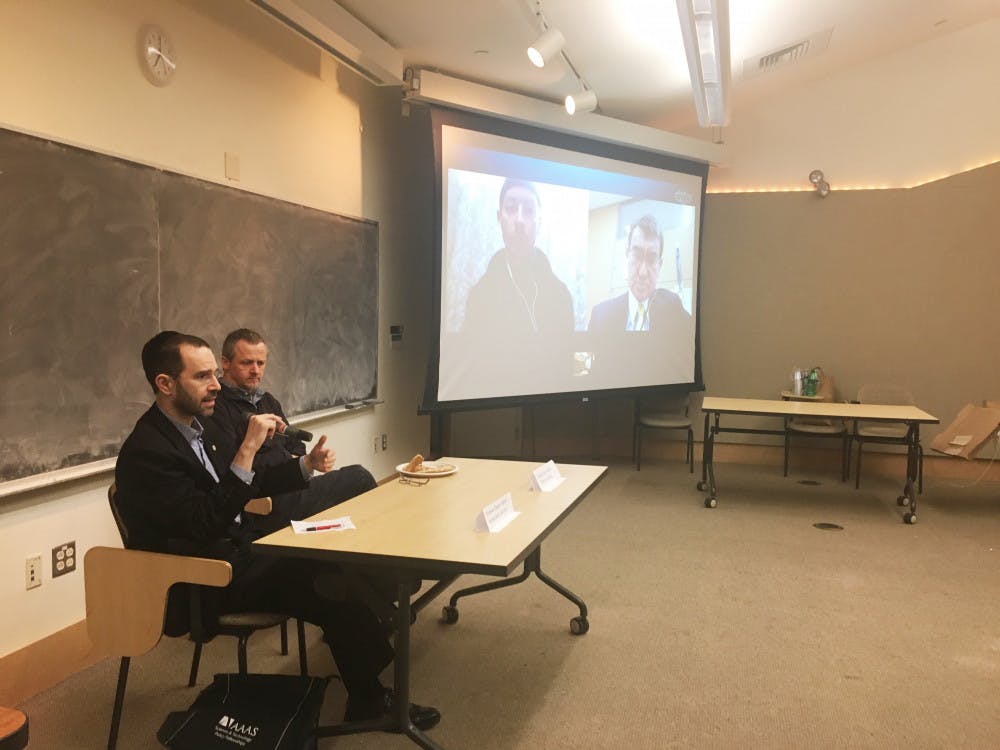Though the Fukushima nuclear disaster occurred six years ago, it carries lasting implications that remain today throughout Japan and around the world. On Thursday, Brown’s Japanese Cultural Association presented “The Politics of Uncertainty: Reassessing Japan After the Fukushima Nuclear Disaster,” which included a film screening and discussion panel to examine these effects.
“The nuclear disaster isn’t over, and as people become numb to tragic events, we refuse to forget about this,” said Akira Camargo ’18, co-leader of JCA. The event aimed to encourage students to “look at the mistakes from the disaster and think about where to go from here,” added Erika Byun ’17, co-leader of JCA.
The event began with a film screening of “A2-B-C,” a documentary by Ian Thomas Ash, which told the stories of children who were found to have thyroid abnormalities 18 months after the 2011 disaster.
Following the screening, a panel answered questions from the audience and JCA about the disaster. Among the panel, two members Skyped-in: Ian Thomas Ash, the film director, and Kono Taro, an active anti-nuclear member of Japan’s House of Representatives. Daniel Aldrich, director of the security and resilience program at Northeastern University, and Kerry Smith, associate professor of history and east Asian studies at Brown, also spoke Thursday evening.
Shosuke Hasegawa, an international student from Japan who experienced the effects of the disaster firsthand, asked about the overarching movement by the government, hospitals and even teachers attempting to hide information about radioactivity in Japan.
“This suppression of information isn’t unique to Japan — it’s simply the way that governments react when something bad happens,” Ash said. “But it does make the Japanese government lose credibility, even six years later.”
Aldrich added that the deliberate acts of cover-up — for example, the government’s failure to release radiological data assessment — detrimentally affected citizens who unknowingly fled to areas that still had exposure to radiation.
“Knowingly allowing people to evacuate into areas that were more heavily contaminated than where they began — that’s criminal,” Ash added.
The government’s moves to hold back facts and the ramifications of doing so were thoroughly scrutinized in the evening’s question and answer session.
“The Japanese nuclear industry has always been corrupt and secretive, and both their and the government’s failure to release information became obvious later on,” Taro said.
Panelists said this lack of transparency led many Japanese citizens to doubt the government, scientists and so-called nuclear and medical “experts.”
“The disagreement between experts can be quite disconcerting to the public when they typically rely on science for certainty,” Kerry said. He added that the earth science community was deeply cognizant of its failure to provide a satisfying answer as to the after-effects of the disaster.
Beyond the physical dangers posed by the radiation, the emotional and psychological impacts on Japanese citizens have also been largely ignored, even as the increase in “divorce rates, domestic violence, gambling and prostitution since the disaster has shown measurable social impact,” said Aldrich.
“The government says no one has died as a direct result, but how can you say that the increase in suicides has nothing to do with the natural disaster?” Ash pointed out.
Yet even as these consequences linger, panelists said the Japanese government is still failing to provide adequate help to its endangered citizens, choosing instead to focus their money and resources on other areas such as the 2020 Tokyo Olympics.
“I definitely do see that the government is trying to move attention away from this issue when, in reality, many lives are still emotionally damaged from this event,” Aldrich said.
Taro brought up the importance of United States-Japan relations in reprocessing nuclear fields in Japan to remove plutonium, hoping that both governments will “put this issue on the table” in order to stop plutonium preparation by the Japanese nuclear industry.
In concluding, Ash expressed hope that people watching his film would consider what would happen if such a disaster occurred in their own country. He reminded the audience of Japan’s outpouring of funding toward the Olympics “when there are people still living in temporary housing in Fukushima six years after the accident.”





